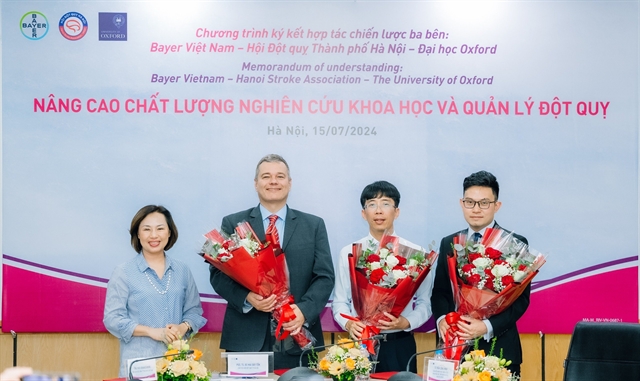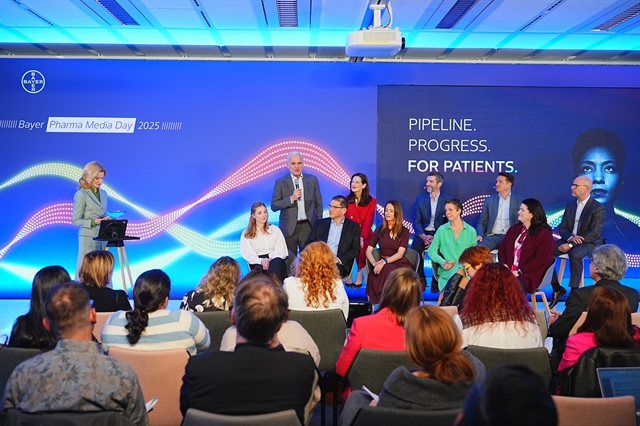 Society
Society

 |
BERLIN, GERMANY – Global science company Bayer is gearing up to launch an array of groundbreaking products with blockbuster potential in 2025, a top company official said on Tuesday.
Stefan Oelrich, a member of the board of management of Bayer AG and president of Bayer’s pharmaceuticals division, speaking at the Pharma Media Day held in Germany, said: “2025 marks a significant launch year for Bayer Pharmaceuticals, and we are fully committed to harnessing the potential of our robust pipeline.”
The event showcased notable progress in Bayer's pharmaceutical growth strategy, underscoring its substantial investments in research and development to accelerate medical innovations.
Bayer has strategically built a highly differentiated pipeline focusing on key therapeutic areas such as oncology, cardiovascular diseases, neurology, rare diseases, and immunology.
Besides, advancements have also been achieved in the realm of cell and gene therapy with important clinical milestones reached, particularly in treating Parkinson’s disease.
Bayer aims to introduce a new treatment for patients suffering from heart failure with a left ventricular ejection fraction of 40 per cent or higher—a prevalent form of heart failure—by the end of 2025.
It also plans to offer an innovative hormone-free treatment designed to alleviate moderate to severe vasomotor symptoms in menopausal women.
It plans to enhance its leadership position by introducing a new treatment option for men grappling with metastatic hormone-sensitive prostate cancer.
Christine Roth, executive vice president of global product strategy and commercialisation and a member of the pharmaceuticals leadership team at Bayer, said: "We are shaping a new era of medicine, confident that we can not only transform patient care through breakthrough innovation and a robust product portfolio, but also accelerate patient access to new medicines.
“With every new development, we move one step closer to realising our vision: to treat the untreatable, cure disease, and offer hope.”
The company’s strategic transformation has led to significant progress in R&D, delivering a competitively structured and differentiated pipeline.
In 2024 the company’s late-stage Phase III trials delivered positive outcomes.
Dr Christian Rommel, PhD, member of Bayer’s pharmaceuticals executive committee and head of research and development, said: “Our renewed early pipeline positions us for long-term growth, allowing us to advance targeted treatments that promise to significantly improve patient outcomes.
“We are now poised to deliver innovative therapies that will make a meaningful difference in patients' lives while driving sustainable business growth.”
Driving growth and strengthening leadership
Significant growth and strengthened leadership across key therapeutic areas, including oncology, cardiovascular, women’s health, are at the heart of Bayer’s strategy.
The company is intensifying efforts to establish itself as a leader in prostate cancer treatment, addressing one of the most prevalent cancers among men.
Bayer's focus on three key scientific areas—targeted radiopharmaceuticals, next-generation immuno-oncology, and precision molecular oncology—has the potential to meet the unmet needs of cancer patients.
By advancing innovative projects in these fields, it aims to introduce truly pioneering treatments.
In precision cardiology, it is committed to exploring innovative approaches across a broad range of modalities with the goal of revolutionising care for individuals with cardiovascular conditions.
It seeks to address substantial unmet needs and potentially reverse life-altering diseases.
In women’s health, Bayer is dedicated to addressing the needs of menopausal women to enhance their quality of life.
It is investing in innovation to expand treatment options and raise the standard of care.
One of its upcoming initiatives in 2025 is the launch of a new hormone-free treatment for menopause, which has shown consistent promise in alleviating moderate to severe vasomotor symptoms and improving sleep disturbances—issues often experienced during menopause or as a side effect of breast cancer treatments.
Clinical Phase III studies have also demonstrated improvements in menopause-related quality-of-life challenges.
Furthermore, in collaboration with BlueRock Therapeutics, a wholly owned Bayer subsidiary, the company is advancing an investigational cell therapy designed to implant dopamine-producing nerve cell precursors into the brain.
Following promising Phase I data, the treatment is progressing to Phase III clinical development.
The FDA has granted it Regenerative Medicine Advanced Therapy designation in recognition of its innovative potential for treating Parkinson’s disease. -- VNS









